Notes: Me and My Surroundings | GK Olympiad for Class 3 PDF Download
| Table of contents |

|
| Our Body |

|
| The Food We Eat |

|
| The Wonderful World of Festivals |

|
| The Wonderful World of Professions |

|
| Family |

|
Our Body
Introduction to Our Body
- Our body is like a machine made up of many parts that work together.
- These parts are called organs, and they form organ systems.
- Each organ system has a special job to keep us healthy and active.
What is an Organ System?
- An organ system is a group of organs that work together to do a big job.
- Think of it like a team of players in a game. Each player (organ) has a role, and together they win the game (keep our body working).
External Organs
- External organs are parts of our body that we can see and touch.
- These organs help us interact with the world around us.
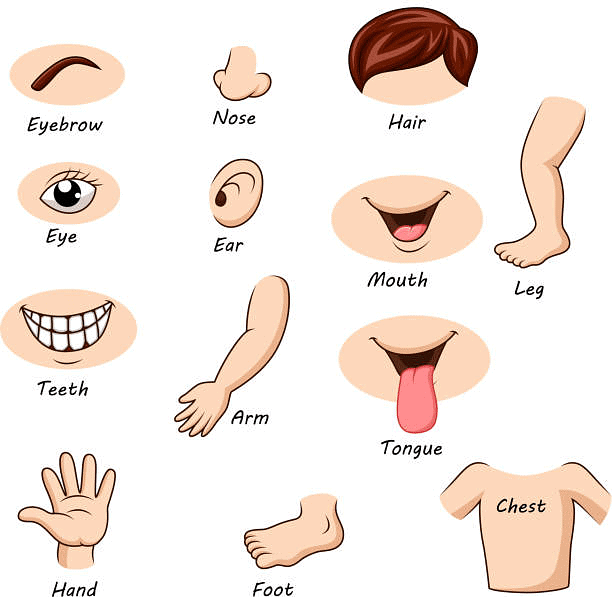
Examples of External Organs:
Skin: It covers our whole body and protects us from getting hurt. It also helps us feel things like hot, cold, and touch.
Eyes: We use our eyes to see everything around us. They help us read, watch TV, and play games.
Ears: Our ears help us hear sounds. We can listen to music, hear people talking, and even hear birds singing.
Nose: We use our nose to smell things. It helps us enjoy delicious smells like flowers and food.
Mouth: We use our mouth to talk, eat, and drink. It helps us taste food and communicate with others.
Internal Organs
- Internal organs are parts of our body that are inside, where we can't see them.
- These organs have very important jobs that keep our body working properly.
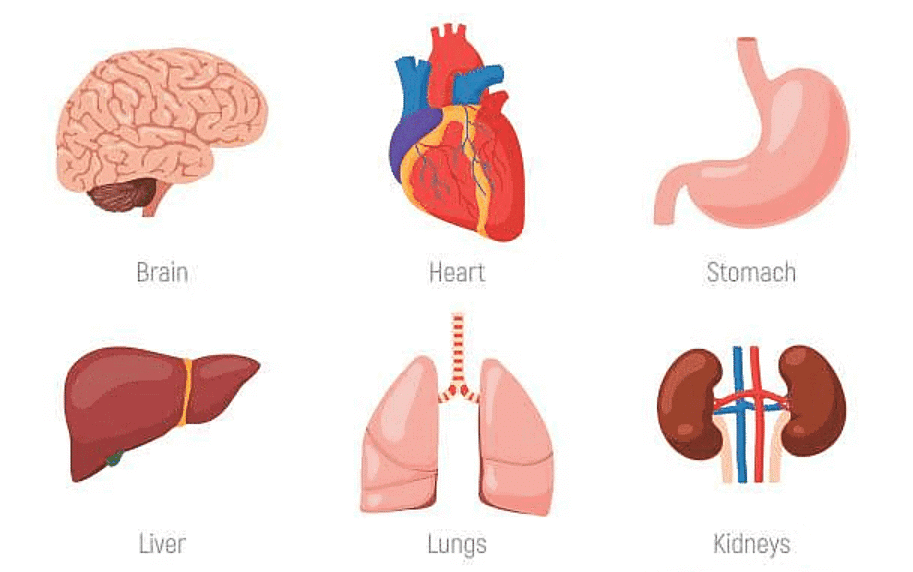
Examples of Internal Organs:
Heart: The heart is inside our chest. It pumps blood all around our body, giving us the energy we need to play and learn.
Lungs: We have two lungs inside our chest. They help us breathe by taking in oxygen from the air and getting rid of carbon dioxide.
Stomach: The stomach is in our belly. It helps digest the food we eat, turning it into energy.
Brain: The brain is inside our head. It's like a control center, telling our body what to do. It helps us think, learn, and remember things.
Liver: The liver is in our belly too. It helps clean our blood and makes important chemicals for our body.
Important Organ Systems in Our Body
a) The Skeletal System
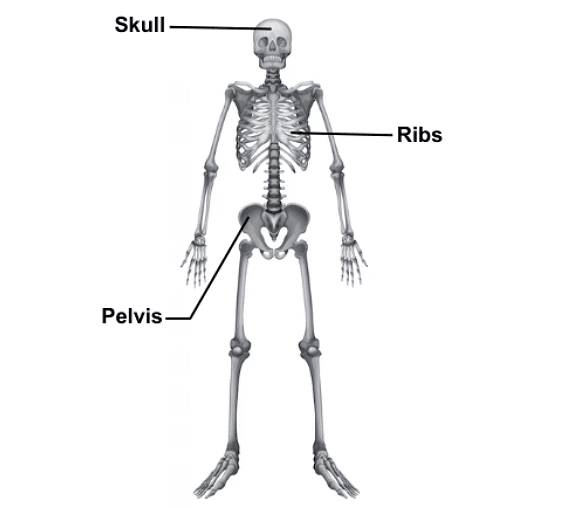
- Bones and Joints:
- Our skeletal system is made up of bones and joints.
- Bones are hard and strong parts inside our body that give us shape.
- Joints are like hinges that connect our bones and help them move.
- Function:
- The skeleton is like the framework of a house; it holds everything up and supports our body.
- It protects important organs inside us, like the brain is protected by the skull and the heart and lungs are protected by the ribcage.
- Bones and joints work together to help us move. When we run, jump, or play, our bones and joints are busy working.
b) The Muscular System
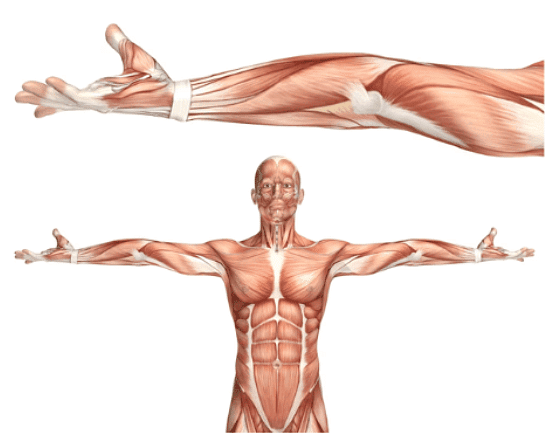
Muscles:
- Our muscular system is made up of muscles.
- Muscles are stretchy and flexible parts that can pull on our bones to make them move.
Function:
- Muscles are like the engine of a car. They make our bones move by pulling on them.
- When you lift your arm to wave, your muscles are doing the work.
- They help us do everything from smiling to jumping high in the air.
c) The Circulatory System
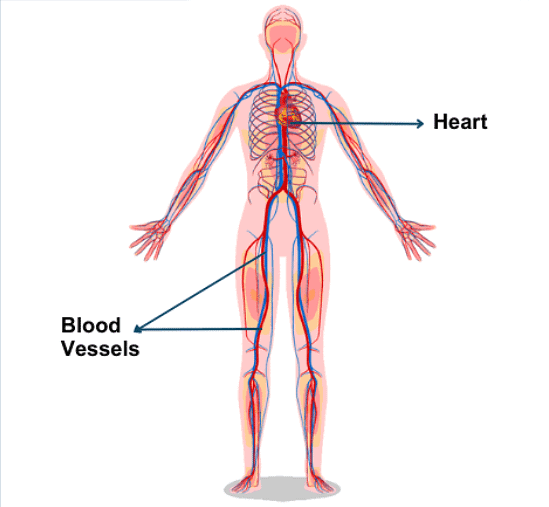
Heart and Blood Vessels:
- The circulatory system includes the heart, which is a strong muscle, and blood vessels, which are like tiny tubes all over our body.
Function:
- The heart is like a pump that pushes blood through the blood vessels.
- Blood is like a delivery service that carries oxygen and nutrients to all parts of our body so we have energy to play and learn.
- The blood also carries waste products away so our body can get rid of them.
d) The Respiratory System
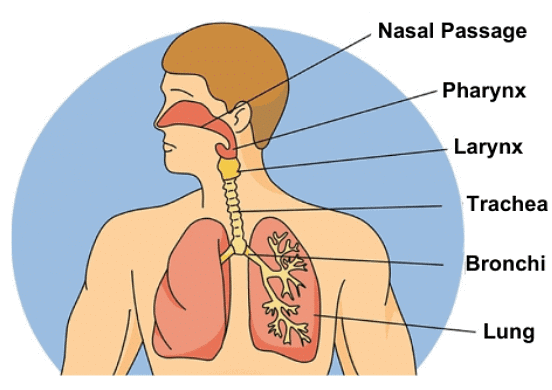
Lungs and Windpipe:
- Our respiratory system is made up of the lungs and windpipe.
- The windpipe is a tube that connects our mouth and nose to our lungs.
Function:
- When we breathe in, our lungs fill up with air. This air has oxygen, which our body needs to live.
- When we breathe out, we get rid of carbon dioxide, which our body doesn’t need.
- It’s like blowing up and deflating a balloon!
e) The Digestive System
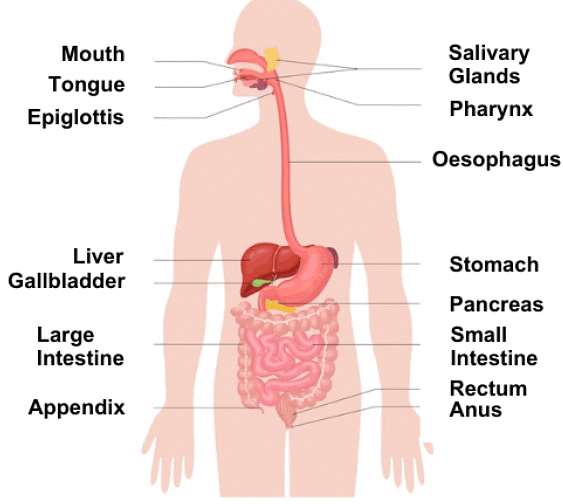
Mouth, Stomach, and Intestines:
- The digestive system includes the mouth, stomach, and intestines.
- Food goes on a journey through these organs.
Function:
- It starts in the mouth, where we chew food into smaller pieces.
- The food then travels to the stomach, where it gets mixed and mashed into a liquid.
- Finally, it moves to the intestines, where the nutrients are taken out and sent to the rest of our body to give us energy.
- It’s like a food processing factory inside our body!
f) The Nervous System
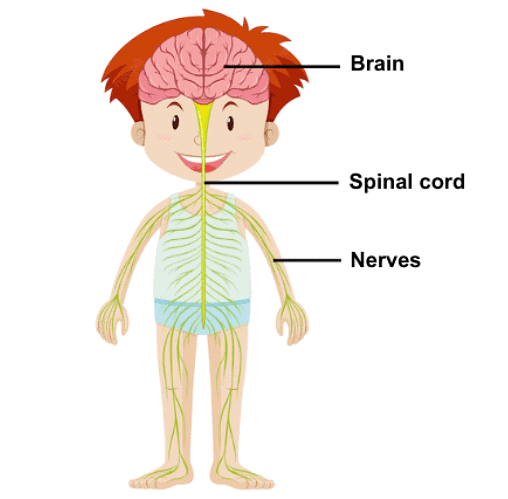
Brain, Spinal Cord, and Nerves:
- The nervous system includes the brain, spinal cord, and nerves.
- The brain is like the boss of our body. The spinal cord is a long bundle of nerves that runs down our back, and nerves are tiny wires that spread all over our body.
Function:
- The brain sends messages to all parts of our body through the nerves.
- It’s like a super-fast messaging system that tells us to move, feel, and think.
- When you touch something hot, your nerves quickly tell your brain, and your brain tells your hand to move away. It all happens in a flash!
4. Taking Care of Our Organ Systems
Healthy Eating: Eat fruits, vegetables, and healthy foods to give your body the nutrients it needs.
Exercise: Stay active by playing and exercising to keep your muscles and bones strong.
Rest: Get plenty of sleep so your body can rest and repair itself.
Cleanliness: Keep your body clean to prevent germs from making you sick.
The Food We Eat
Imagine you're a superhero, and your special powers come from the food you eat! Just like how superheroes need their super suits and gadgets to save the day, we need food to give us energy, help us grow, and keep us healthy. Food is not just something we eat because we're hungry; it's a magical fuel that makes our bodies strong, smart, and full of energy.
Every time we eat a delicious apple, a crunchy carrot, or a yummy sandwich, we're giving our body the power it needs to run, jump, think, and play. Food is like a rainbow of different flavors, colors, and nutrients, each with its own special job to do. Some foods make us big and strong like a towering tree, while others help us fight off germs like a brave knight.
So, let's dive into the wonderful world of food and discover how every bite we take helps us become the best superhero we can be!
Why Do We Need Food?
- Energy: Food gives us the energy to play, learn, and grow.
- Health: It keeps us healthy and protects us from getting sick.
- Growth: Food helps our body grow and repair itself when we get hurt.
Types of Food
We eat different kinds of food, and each type helps our body in different ways. Let's learn about the different types of food and what they do for us.
a) Energy-Giving Food
- Examples: Rice, wheat, maize (corn), potatoes, sugar, and butter.
- Function: These foods give us lots of energy to work and play. Imagine they are like the fuel for our body, just like petrol is for a car.
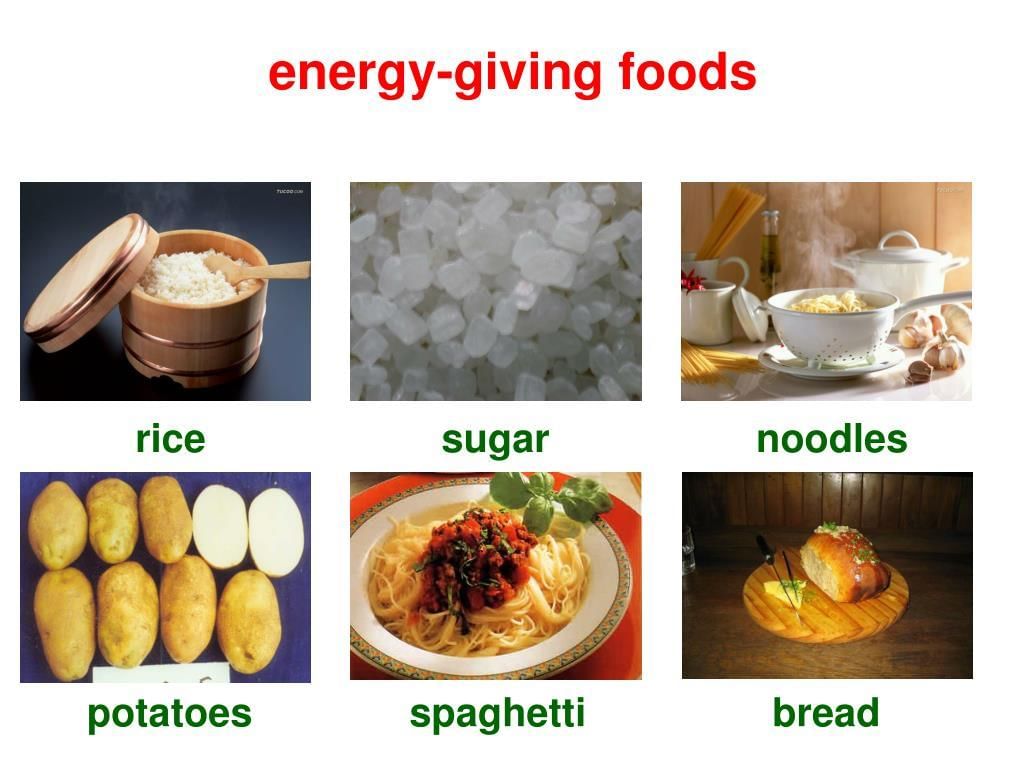
b) Body-Building Food
- Examples: Pulses (like beans and lentils), cheese, eggs, fish, and peas.
- Function: These foods help us grow and make our muscles strong. Think of them as the building blocks for our body, helping us get bigger and stronger.
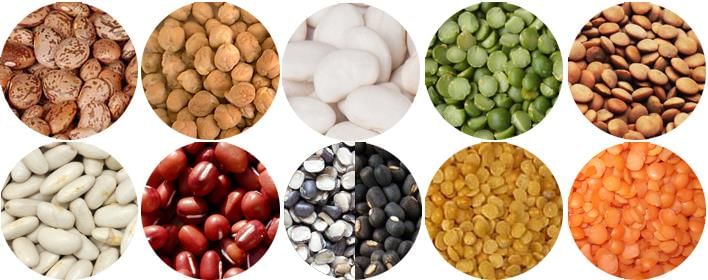
c) Protective Food
- Examples: Fruits, vegetables, milk, and eggs.
- Function: These foods help us stay healthy by fighting off germs and diseases. They are like our body's superheroes, keeping us safe from getting sick.
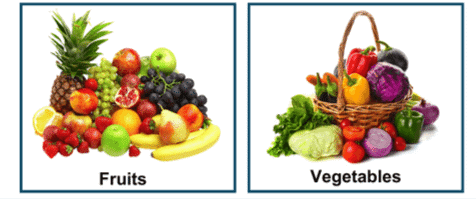 Nutrients in Our Food
Nutrients in Our Food
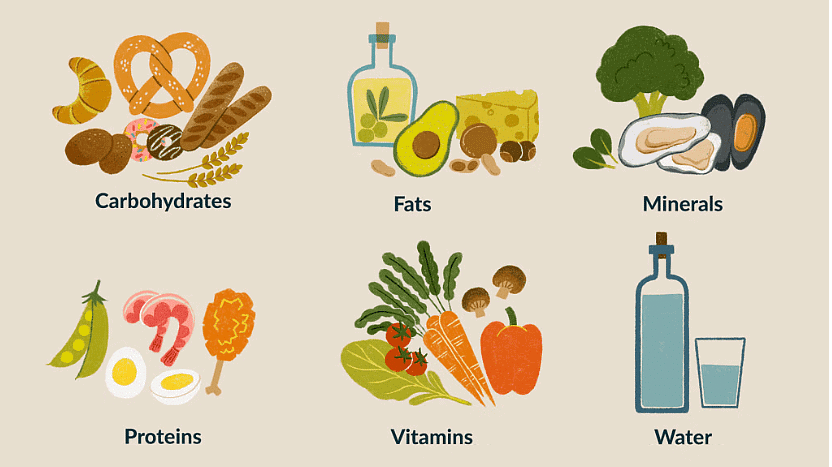
1. Carbohydrates
Carbohydrates are like the fuel for our body. They give us the energy we need to play, study, and do all our activities.
Examples: Rice, wheat, maize (corn), potatoes, and sugar.
Function: When we eat carbohydrates, our body turns them into energy. This energy helps us run, jump, think, and grow.
2. Proteins
Proteins are the building blocks of our body. They help us grow and repair our body when we get hurt.
Examples: Pulses (like beans and lentils), cheese, eggs, fish, and peas.
Function: Proteins help build and fix muscles, skin, and other tissues. They also help make new cells in our body.
3. Fats
Fats give us extra energy and help keep our body warm.
Examples: Butter, oils, nuts, and seeds.
Function: Fats store energy for later use. They also protect our organs and help keep our body warm.
4. Vitamins
Vitamins are special nutrients that help our body stay healthy and work properly.
Examples: Fruits and vegetables are full of vitamins.
Function:
- Vitamin A: Good for our eyes and skin. Found in carrots and spinach.
- Vitamin C: Helps heal cuts and keeps our gums healthy. Found in oranges and strawberries.
- Vitamin D: Helps our bones stay strong. Found in milk and sunlight.
5. Minerals
Minerals help our body grow and stay healthy. They are found in many different foods.
Examples: Milk, leafy vegetables, and meat.
- Function:
- Calcium: Makes our bones and teeth strong. Found in milk and cheese.
- Iron: Helps our blood carry oxygen. Found in spinach and red meat.
- Potassium: Helps our muscles work. Found in bananas and potatoes.
6. Roughage (Fiber)
Roughage, also known as fiber, is the part of plants that our body can't digest.
Examples: Fruits, vegetables, whole grains, and beans.
Function:
- Roughage helps our digestive system work properly.
- It adds bulk to our stool and makes it easier to pass, preventing constipation.
- It keeps our stomach healthy and makes us feel full, so we don't overeat.
7. Water
Water is a vital part of our diet. Most of our body is made up of water.
Function:
- Water helps keep our body temperature normal.
- It helps digest the food we eat.
- It carries nutrients to all parts of our body.
- It helps get rid of waste through urine and sweat.
- We need to drink 6 to 8 glasses of water every day to stay healthy.
Balanced Diet
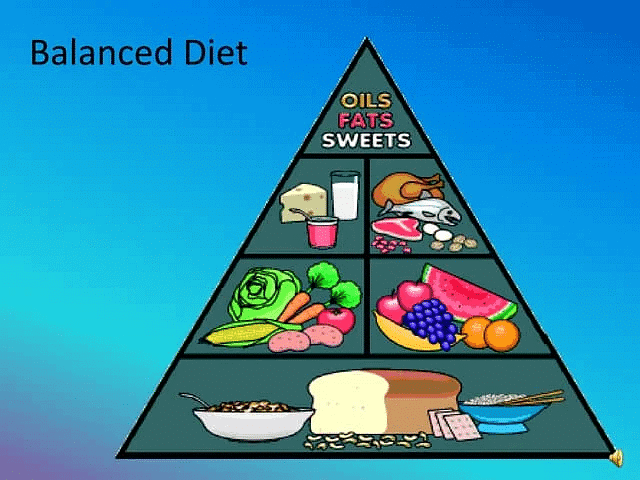
What is a Balanced Diet?
Imagine you're building a super cool LEGO castle. To make it strong and awesome, you need different types of blocks. Just like that, your body needs different kinds of foods to be healthy and strong. This mix of foods is called a balanced diet!
Why is it Important?
- Gives Energy: Foods like rice, bread, and potatoes are like the fuel that keeps your engine running so you can play and have fun all day.
- Helps You Grow: Foods like meat, beans, and cheese are like the building blocks that help you grow taller and stronger.
- Keeps You Healthy: Fruits and vegetables are like your body's superheroes, fighting off germs and keeping you healthy.
What Should You Eat?
- Carbohydrates: Bread, rice, and pasta are like the fuel for your body's engine.
- Proteins: Meat, fish, eggs, and beans are like the bricks that build your muscles.
- Fruits and Vegetables: Apples, carrots, and spinach are like your body's shield, protecting you from sickness.
- Dairy: Milk, cheese, and yogurt are like the glue that keeps your bones strong.
- Fats: Nuts and butter are like the extra power boost for your body (but not too much!).
Remember:
- Eat a rainbow of different foods to get all the good stuff your body needs.
- Don't eat too much junk food, like candies and chips. They are fun sometimes, but not every day.
- Drink lots of water to keep your body happy and hydrated.
Healthy Eating Tips for Kids
- Eat a variety of foods to get all the nutrients you need.
- Include lots of fruits and vegetables in your meals.
- Drink plenty of water every day.
- Avoid eating too much sugar and junk food.
- Wash your hands before eating to keep germs away.
The Wonderful World of Festivals
Festivals are special days filled with fun, celebration, and joy. They bring people together and make us feel happy and united. Let's learn about some of the amazing festivals celebrated in our country!
National Festivals
These are festivals celebrated by the whole country. They remind us of important events in our nation's history.
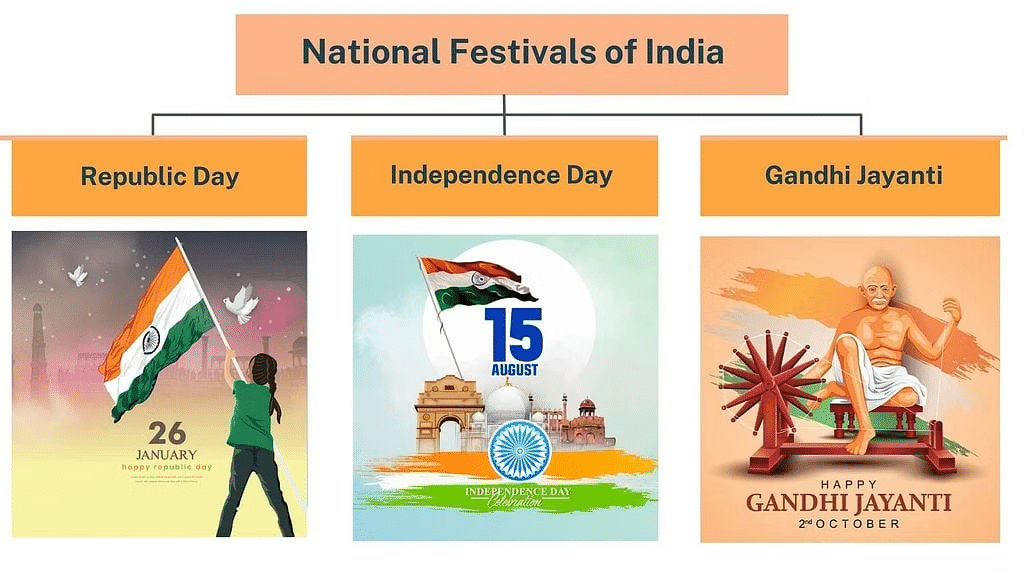
1. Independence Day
- When: August 15th
- Why: To celebrate the day India got its freedom from British rule in 1947.
- How: The Prime Minister hoists the national flag at the Red Fort in Delhi, and we remember the heroes who fought for our freedom with parades and cultural programs.
2. Republic Day
- When: January 26th
- Why: To celebrate the day India became a republic in 1950.
- How: A grand parade is held in New Delhi, showcasing our military strength and cultural diversity. Floats from different states display their unique traditions.
3. Gandhi Jayanti
- When: October 2nd
- Why: To honor the birthday of Mahatma Gandhi, the Father of the Nation.
- How: People participate in prayer meetings and remember Gandhi's teachings of non-violence and peace.
Religious Festivals
These festivals are celebrated by people of different religions and bring out the rich cultural diversity of India.
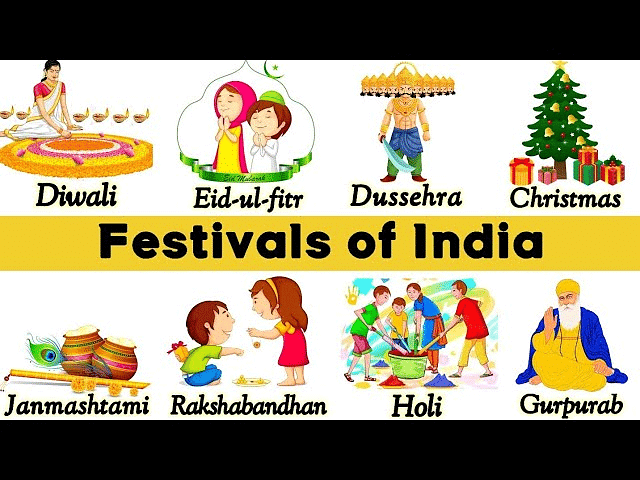
1. Diwali
- Also Known As: The Festival of Lights
- When: October or November
- Why: To celebrate the return of Lord Rama to Ayodhya after defeating Ravana.
- How: People light lamps, decorate their homes, burst fireworks, and exchange sweets.
2. Holi
- Also Known As: The Festival of Colors
- When: March
- Why: To celebrate the victory of good over evil and the arrival of spring.
- How: People throw colored powders at each other, sing, dance, and enjoy delicious sweets like gujiya.
3. Eid-ul-Fitr
- When: At the end of Ramadan
- Why: To mark the end of a month of fasting.
- How: People wear new clothes, offer prayers at mosques, and share meals with family and friends.
4. Christmas
- When: December 25th
- Why: To celebrate the birth of Jesus Christ.
- How: People decorate Christmas trees, exchange gifts, and enjoy special meals. Santa Claus brings gifts for children.
5. Gurpurab
- When: Different dates for different Sikh Gurus
- Why: To celebrate the birthdays of the Sikh Gurus.
- How: People visit Gurdwaras, participate in processions, and share food and sweets.
Harvest Festivals
These festivals celebrate the harvest season and thank nature for its bounty.
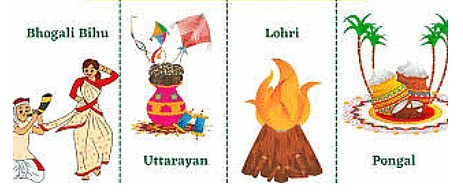
1. Pongal
- When: January
- Where: Tamil Nadu
- How: People cook a special dish called Pongal, worship the sun, and decorate their homes with rangoli.
2. Onam
- When: August or September
- Where: Kerala
- How: People create flower arrangements called pookalam, participate in boat races, and enjoy a grand feast called Onam Sadhya.
3. Baisakhi
- When: April
- Where: Punjab
- How: Farmers thank God for the good harvest, people perform Bhangra and Gidda dances, and visit Gurdwaras.
The Wonderful World of Professions
Professions are the different kinds of work people do to earn money and help the community. Let’s learn about some exciting professions and what makes each one special!
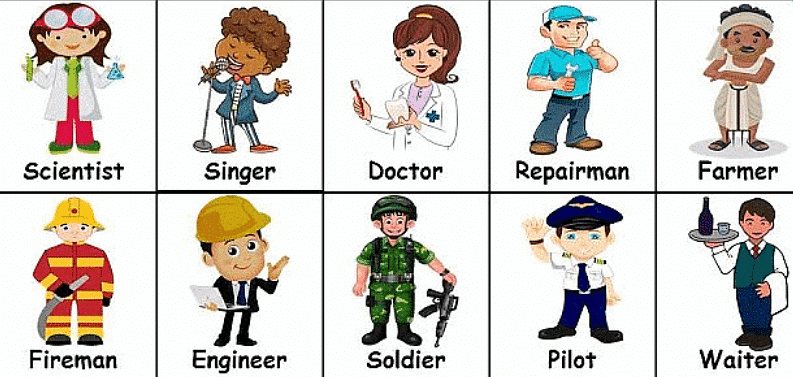
1. Teachers
- What They Do: Teachers help children learn new things. They teach subjects like math, science, and reading.
- Why They’re Important: Without teachers, we wouldn’t know how to read, write, or count! They help us grow smart and ready for the future.
- Fun Fact: Some teachers use fun games and activities to make learning more exciting.
2. Doctors
- What They Do: Doctors take care of sick people and help them get better. They check your health, give you medicine, and perform surgeries if needed.
- Why They’re Important: Doctors keep us healthy and strong. They make sure we can play and enjoy life without feeling sick.
- Fun Fact: Some doctors specialize in treating kids and are called pediatricians.
3. Police Officers
- What They Do: Police officers keep our communities safe. They catch bad guys, help people in trouble, and make sure everyone follows the law.
- Why They’re Important: They protect us from harm and ensure that our neighborhood is a safe place to live.
- Fun Fact: Police officers often have cool gadgets like walkie-talkies and handcuffs.
4. Firefighters
- What They Do: Firefighters put out fires and rescue people from dangerous situations. They also teach us how to be safe from fires.
- Why They’re Important: They save lives and protect our homes from being destroyed by fire.
- Fun Fact: Firefighters sometimes rescue pets from trees or other high places.
5. Farmers
- What They Do: Farmers grow the food we eat, like fruits, vegetables, and grains. They also raise animals like cows and chickens.
- Why They’re Important: Without farmers, we wouldn’t have fresh and healthy food to eat.
- Fun Fact: Some farmers use big machines like tractors to help them work.
6. Engineers
- What They Do: Engineers design and build things like bridges, buildings, and machines. They use math and science to solve problems.
- Why They’re Important: They make our world work better by creating things that we use every day.
- Fun Fact: There are many types of engineers, like civil engineers who build roads and mechanical engineers who create machines.
7. Chefs
- What They Do: Chefs cook delicious meals in restaurants, hotels, and other places. They create recipes and make sure the food tastes great.
- Why They’re Important: Chefs make sure we have tasty and nutritious meals when we eat out.
- Fun Fact: Some chefs become famous and have their own cooking shows on TV.
8. Scientists
- What They Do: Scientists study the world around us and make discoveries. They perform experiments and learn about things like plants, animals, and space.
- Why They’re Important: Scientists help us understand how things work and find new ways to improve our lives.
- Fun Fact: Some scientists study dinosaurs and find their fossils!
9. Artists
- What They Do: Artists create beautiful paintings, sculptures, and other artworks. They use their imagination to express ideas and feelings.
- Why They’re Important: Artists make our world more colorful and interesting with their creativity.
- Fun Fact: Some artists paint murals on buildings to make cities look more vibrant.
10. Athletes
- What They Do: Athletes play sports and compete in games like soccer, basketball, and swimming. They train hard to be the best in their sport.
- Why They’re Important: Athletes inspire us to stay active and healthy. They also entertain us with exciting matches and competitions.
- Fun Fact: Some athletes travel around the world to compete in international events like the Olympics.
Family
Introduction
Imagine you have a team of superheroes who are always there for you, no matter what. They teach you new things, make you laugh, help you when you’re sad, and cheer you on when you’re happy. This amazing team is called your family!
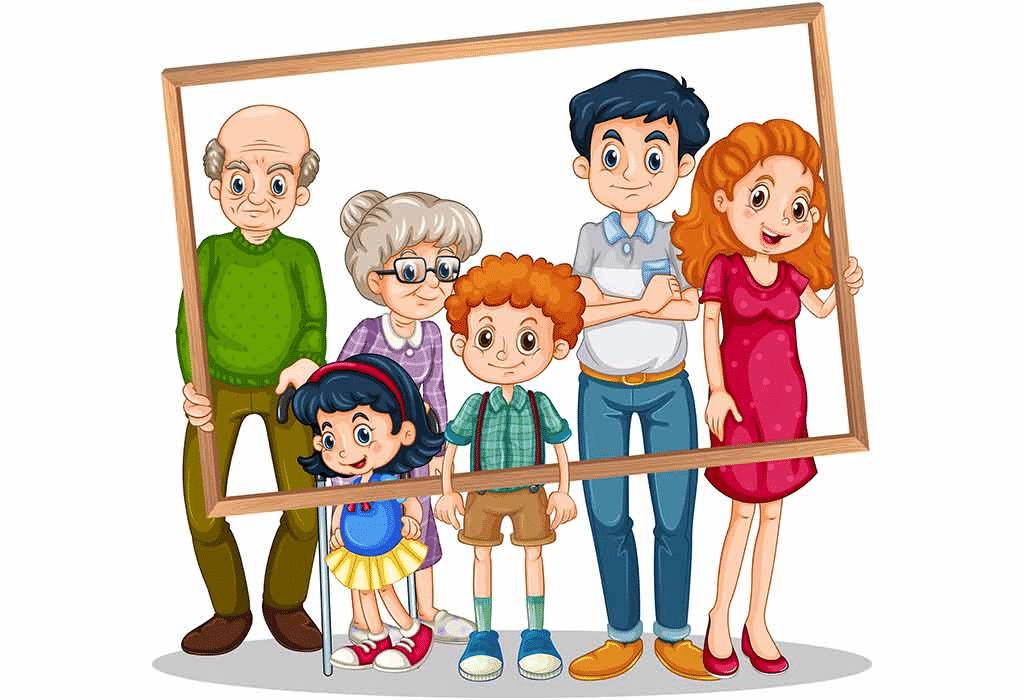
What is a Family?
A family is a group of people who love and care for each other. They can be your parents, brothers, sisters, grandparents, and even your pets! Families live together and share their lives, supporting one another in every way possible. Each family member has a special role and helps make the family strong and happy.
Types of Families
Families come in different shapes and sizes. Let's learn about the different types of families:
1. Nuclear Family
- What is it? A nuclear family is a small family with parents and their children.
- Example: You, your mom, your dad, and your siblings.
2. Extended Family
- What is it? An extended family includes not just parents and their children but also grandparents, uncles, aunts, and cousins.
- Example: Your family, plus your grandparents, uncles, aunts, and cousins.
3. Single-Parent Family
- What is it? A single-parent family is one where either the mom or the dad is raising the children alone.
- Example: You and your mom, or you and your dad.
4. Joint Family
- What is it? A joint family is where multiple generations live together in one house, including grandparents, parents, children, and sometimes uncles and aunts.
- Example: A big family living under one roof, sharing responsibilities and celebrating together.
Family Relations
Understanding family relations helps us know how everyone in our family is connected. Here are some common family relations:
1. Parents
- Mom and Dad: They are the ones who take care of you and help you grow.
2. Siblings
- Brothers and Sisters: They are your playmates and friends at home.
3. Grandparents
- Grandma and Grandpa: They are your parents' parents and often share wonderful stories and wisdom.
4. Uncles and Aunts
- Uncle and Aunt: They are your parents' siblings and can be lots of fun to be around.
5. Cousins
- Cousins: They are the children of your uncles and aunts. They can be your first friends.
What is a Family Tree?
A family tree is a special chart that shows the members of a family. It's like a big map that helps us understand who is related to whom in our family. Just like a tree has roots, branches, and leaves, a family tree has different levels or generations.
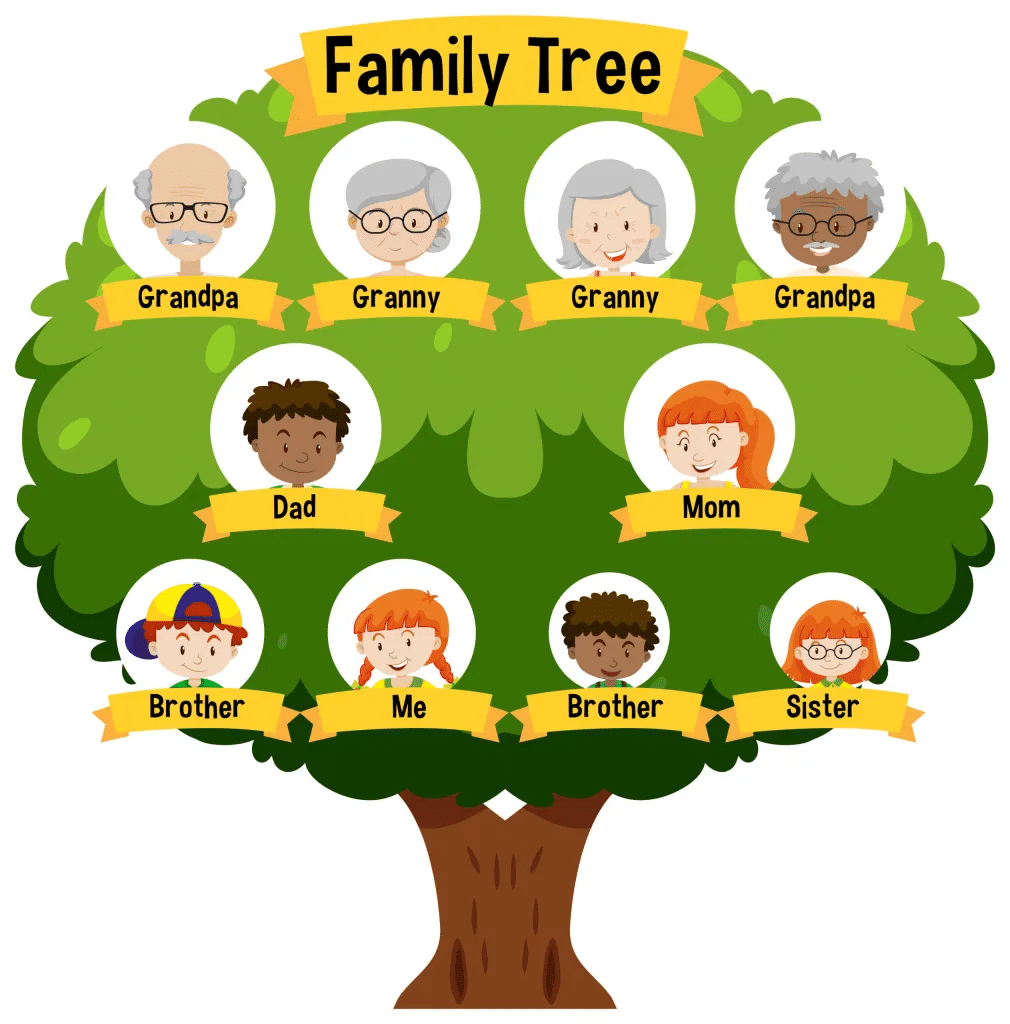
Why is a Family Tree Important?
- Learn About Our Family: It helps us learn about our grandparents, parents, and other relatives.
- Know Our Roots: We can understand our family's history and where we come from.
- Connect with Relatives: It helps us see how we are connected to our cousins, uncles, aunts, and other family members.
|
44 videos|31 docs|44 tests
|
FAQs on Notes: Me and My Surroundings - GK Olympiad for Class 3
| 1. What are some common traditional festivals celebrated around the world? |  |
| 2. How do people celebrate festivals in different countries? |  |
| 3. What is the significance of festivals in different cultures? |  |
| 4. How do professions differ in various parts of the world? |  |
| 5. How does our body process the food we eat? |  |















